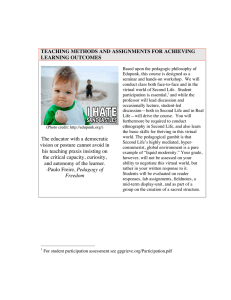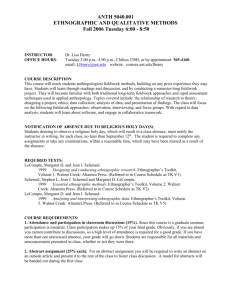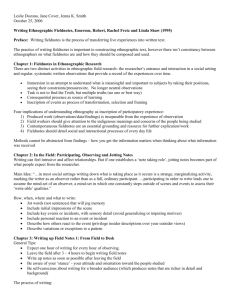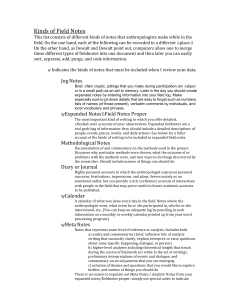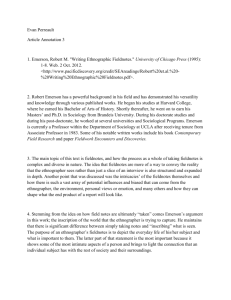Fieldwork: Data Collection
advertisement
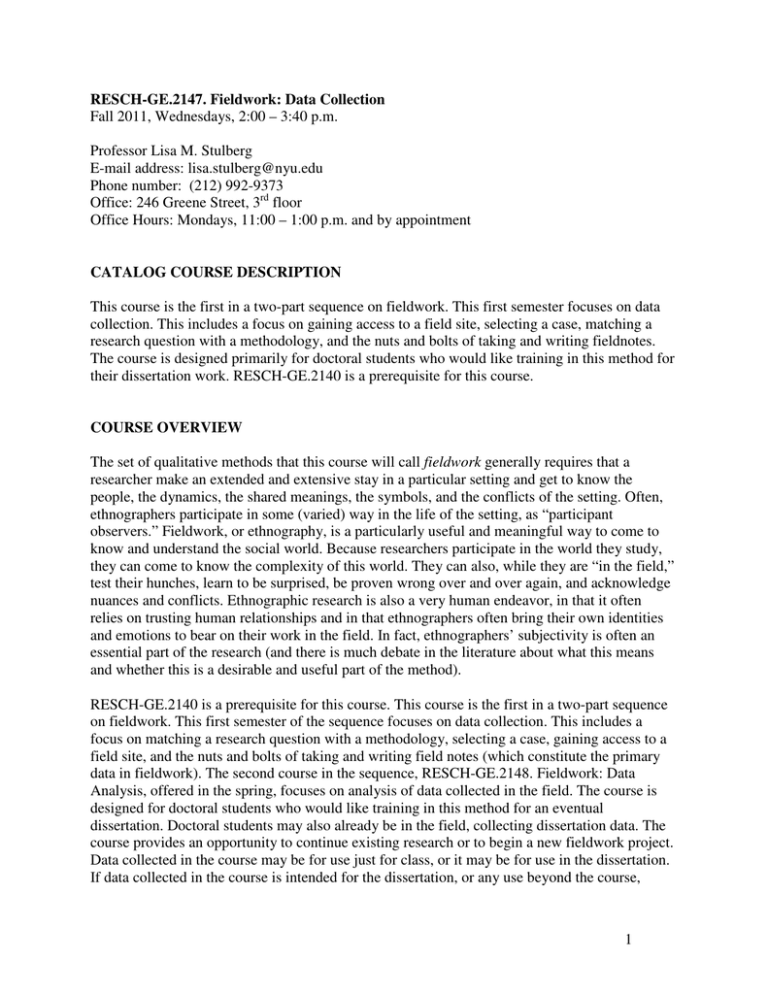
RESCH-GE.2147. Fieldwork: Data Collection Fall 2011, Wednesdays, 2:00 – 3:40 p.m. Professor Lisa M. Stulberg E-mail address: lisa.stulberg@nyu.edu Phone number: (212) 992-9373 Office: 246 Greene Street, 3rd floor Office Hours: Mondays, 11:00 – 1:00 p.m. and by appointment CATALOG COURSE DESCRIPTION This course is the first in a two-part sequence on fieldwork. This first semester focuses on data collection. This includes a focus on gaining access to a field site, selecting a case, matching a research question with a methodology, and the nuts and bolts of taking and writing fieldnotes. The course is designed primarily for doctoral students who would like training in this method for their dissertation work. RESCH-GE.2140 is a prerequisite for this course. COURSE OVERVIEW The set of qualitative methods that this course will call fieldwork generally requires that a researcher make an extended and extensive stay in a particular setting and get to know the people, the dynamics, the shared meanings, the symbols, and the conflicts of the setting. Often, ethnographers participate in some (varied) way in the life of the setting, as “participant observers.” Fieldwork, or ethnography, is a particularly useful and meaningful way to come to know and understand the social world. Because researchers participate in the world they study, they can come to know the complexity of this world. They can also, while they are “in the field,” test their hunches, learn to be surprised, be proven wrong over and over again, and acknowledge nuances and conflicts. Ethnographic research is also a very human endeavor, in that it often relies on trusting human relationships and in that ethnographers often bring their own identities and emotions to bear on their work in the field. In fact, ethnographers’ subjectivity is often an essential part of the research (and there is much debate in the literature about what this means and whether this is a desirable and useful part of the method). RESCH-GE.2140 is a prerequisite for this course. This course is the first in a two-part sequence on fieldwork. This first semester of the sequence focuses on data collection. This includes a focus on matching a research question with a methodology, selecting a case, gaining access to a field site, and the nuts and bolts of taking and writing field notes (which constitute the primary data in fieldwork). The second course in the sequence, RESCH-GE.2148. Fieldwork: Data Analysis, offered in the spring, focuses on analysis of data collected in the field. The course is designed for doctoral students who would like training in this method for an eventual dissertation. Doctoral students may also already be in the field, collecting dissertation data. The course provides an opportunity to continue existing research or to begin a new fieldwork project. Data collected in the course may be for use just for class, or it may be for use in the dissertation. If data collected in the course is intended for the dissertation, or any use beyond the course, 1 students will need University Committee on Activities Involving Human Subjects (UCAIHS) approval before they begin the semester (please see below). Because of the nature of fieldwork, this class will be quite time-intensive. The first half of the course will center around reading a number of classic and more current, well-known ethnographies. Through these examples, students will discuss research design questions, methodology and methodological choices, the logistics of fieldwork, and narrative strategies and choices. The second half of the semester will be more hands-on, as students will enter the field and conduct their own fieldwork. This will require substantial weekly work in the field and weekly fieldnotes. There will be a heavy emphasis in this course on workshopping. Once students are in the field, they will spend time each week presenting their work and giving and receiving feedback on their research projects. By the end of the course, students will be able to: • • • • Describe the intellectual tradition of fieldwork and the methodological and ethical issues it raises Gain access to a field site and conduct fieldwork (regular observations) at this site. Utilize observational skills on-site during data collection Write high-quality fieldnotes GRADED REQUIREMENTS • • • Class Participation: 25% of grade 2 Sets of Fieldnotes: 25% of grade and 30% of grade (Due at the beginning of class: November 9th and November 30th) Analytic Memo: 20% of grade (Due at the beginning of class: December 7th) COURSE REQUIREMENTS & POLICIES 1. Office Hours: I have regularly scheduled office hours and am available by appointment. I am also regularly accessible by e-mail and by phone. I will make every effort to respond as promptly as possible to all e-mails. 2. University Committee on Activities Involving Human Subjects approval: Because all research involving “human subjects” (people) requires review and approval (or the granting of exemption) by the university’s Institutional Review Board, any student who wishes to use the research they conduct in class for a dissertation, conference presentation, or any publication (or any other use outside of this course) must first gain UCAIHS approval. Please discuss this with me individually. 3. Original Field Research: This course is built around students’ own original research projects. Students may use the opportunity of the course to continue work on an ongoing project or to begin a new project that lasts at least half a semester or continues once the course is over. All 2 students are expected to gain entry into a setting within the first half of the course (we will talk more about the details of this). Students then will be expected to spend 6 or 7 weeks “in the field.” While the schedule of your visits to your research site will vary with your particular project, I expect that you will spend a total of 30-40 hours in the field over the course of the semester. Along with participant observation, your research may include interviews, document analysis, and other qualitative methods that help to enrich your fieldwork. 4. Class Attendance and Participation: Class attendance is required for this course. If you must miss or arrive late to a class for any reason, please let me know in advance. I expect that everyone will participate in class discussion and in-class workshop groups. I also expect that this participation will be based on an informed familiarity and thoughtful engagement with the assigned reading and with assignments. During the second half of the course, students will be assigned to small working groups (see below). Every third week, members of each small group will present their research to the large group. These large group sessions will give everyone an opportunity to learn from each other and to come to know each other’s projects. 5. Working Groups: A significant amount of your class participation will be in the form of your work with each other on your projects. You will be part of a small working group that will meet each week in the second half of the semester and that will serve as a source of support and feedback in and out of class while you are in the field. In your working group you will share your experience in the field, your fieldnotes, and your memos. These groups provide an opportunity to give and receive feedback on your work throughout the semester. Individual groups should develop their own working guidelines and systems for both in and outside of class. We will discuss details once the semester is underway. 6. Fieldnotes: Fieldnotes are the primary form of data for ethnographic work. When researchers are in the field for extended periods of time, it is critical that they write prompt, extensive, and detailed fieldnotes. While you are in the field, I expect that you’ll take regular notes (we will talk much more about what this means). You should regularly share your fieldnotes with members of your working groups. Twice over the course of the semester, you will submit fieldnotes to me for my feedback and a grade. These are due at the beginning of class on November 9th and November 30th. Fieldnotes will vary significantly in length. I expect that notes from one day in the field might be 5-15 pages single spaced. They generally take somewhere between once and twice the amount of time you were in the field to write (so, 4 hours of ethnographic observation will generally take 4-8 hours to write up in detailed fieldnotes). While generally fieldnotes are not to be shared with others, we will share and discuss these notes in class. We will discuss how to write these so that they can be ethically shared with classmates. 7. Pre-Coding Analytic Memo: As we will discuss, analytic memos are one method of organizing fieldnotes, building on hunches in the field, and beginning to build analysis and craft a narrative from your data. As with fieldnotes, for the most part analytic memos are just for you. They do not need to be polished or definitive pieces of work (you will talk much more about this strategy for managing and analyzing data in the second course in this 3 sequence). I will, however, ask you to submit one analytic memo during the semester, due at the beginning of class on December 7th. These memos, too, vary significantly in length (from just one paragraph to a number of pages). Please turn in a memo that is 3-5 pages doublespaced. 8. Grading Criteria: Fieldnotes and the analytic memo will be graded holistically based on a combination of several criteria: extent of rich, descriptive material; quality and logical progression of ideas and narrative; clarity and organization; mechanics and style. Class participation will be graded based on an assessment of the quality and quantity of the contributions in class, including active and engaged work in the small and large group workshop sessions in class. 9. Proofreading, etc.: All assignments should be thoroughly spellchecked and proofread before they are submitted to me. Please allow time to do this before assignments are due. I reserve the right to lower grades on assignments that are turned in with excessive spelling, formatting, and other proofreading errors. 10. Deadlines: All assignment deadlines are firm. I will not grant extensions, except in the case of absolute emergency. For each day that an assignment is late, the final grade will be lowered by one-third of a grade (e.g., an A- becomes a B+ if an assignment is one day late). Assignments also are considered late if they do not meet the time deadline (e.g., an assignment due at 2 p.m. is due promptly by 2 p.m.). 11. Academic Integrity: All students are responsible for understanding and complying with the NYU Steinhardt Statement on Academic Integrity. A copy is available at http://steinhardt.nyu.edu/policies/academic_integrity. 12. Students with Disabilities: Students with physical or learning disabilities are required to register with the Moses Center for Students with Disabilities, 726 Broadway, 2nd Floor, (212-998-4980) and are required to present a letter from the Center to the instructor at the start of the semester in order to be considered for appropriate accommodation. (Please see http://www.nyu.edu/life/safety-health-andwellness/students-with-disabilities.html) REQUIRED READINGS There are 6 required books for this course. Additional articles and chapters listed in the course outline below will be made available over the course of the semester. The books are available at the campus bookstore. All books also are available on reserve at Bobst Library. These books are (in the order that we will read them this semester): Venkatesh, Sudhir. 2008. Gang Leader for a Day: A Rogue Sociologist takes to the Streets. New York: Penguin Press. [Bobst call number: HV6439.67.C46] Pascoe, C.J. 2007. Dude, You're a Fag: Masculinity and Sexuality in High School. Berkeley: University of California Press. [Bobst call number: HQ797.P37] 4 Lofland, John. et al. 2005. Analyzing Social Settings: A Guide to Qualitative Observation and Analysis. 4th ed. Belmont, CA: Wadsworth Publishing. [Bobst call number: HM571.L63] Duneier, Mitchell. 1994. Slim’s Table: Race, Respectability, and Masculinity. Chicago: University of Chicago Press. [Bobst call number: F548.9.N4.D86] Stevens, Mitchell. 2007. Creating a Class: College Admissions and the Education of Elites. Cambridge: Harvard University Press. [Bobst call number: LB2351.2.S755] Emerson, Robert M., Rachel I. Fretz and Linda L. Shaw. 1995. Writing Ethnographic Fieldnotes. Chicago: The University of Chicago Press. [Bobst call number: GN307.7.E44] 5 COURSE OUTLINE September 7: Introduction: What is Fieldwork? Guest speaker: Anjali Deshpande, Steinhardt doctoral student September 14: Ethnography in Action Sudhir Venkatesh. Gang Leader for a Day: A Rogue Sociologist takes to the Streets. New York: Penguin Press, 2008. Entire book. September 21: Ethnography in Schools C. J. Pascoe. Dude, You're a Fag: Masculinity and Sexuality in High School. Berkeley: University of California Press, 2007. Entire book. September 28: Research Ethics and the University Committee on Activities Involving Human Subjects (UCAIHS) Application and Approval Process Irving Seidman. Interviewing As Qualitative Research: A Guide for Researchers in Education and the Social Sciences. 3rd ed. New York: Teachers College Press, 2006. Chapter 5. Carolina Bank Muñoz. Transnational Tortillas: Race, Gender, and Shop-floor Politics in Mexico and the United States. Ithaca: Cornell University Press, 2008. Chapter 1. IN-CLASS WORKSHOP: As a class, we will do a training observation at a public place (like Starbucks). For next class, please write up your fieldnotes from this observation. We will share them in class next week. October 5: Research Questions, Case Selection, and Gaining Access John Lofland, et al. Analyzing Social Settings: A Guide to Qualitative Observation and Analysis. 4th ed. Belmont, CA: Wadsworth Publishing, 2005. All of Part 1 (chapters 1-5). Nadia Y. Kim. Imperial Citizens: Koreans and Race from Seoul to LA. Stanford: Stanford University Press, 2008. Appendix. Sonja Plesset. Sheltering Women: Negotiating Gender and Violence in Northern Italy. Stanford: Stanford University Press, 2006. Introduction and Chapter 1. Amanda Lewis. Race in the Schoolyard. New Brunswick: Rutgers University Press, 2003. Appendix. 6 IN-CLASS WORKSHOP: Share and discuss fieldnotes from last week’s observation. October 12: The Role of the Ethnographer and Relationships in the Field Duneier, Mitchell. 1994. Slim’s Table: Race, Respectability, and Masculinity. Chicago: University of Chicago Press. Entire book. October 19: Fieldworker as Participant Mitchell Stevens. Creating a Class: College Admissions and the Education of Elites. Cambridge: Harvard University Press, 2007. Entire book. October 26: Interviewing and Fieldwork Cynthia Miller-Idriss. 2006. “Everyday Understandings of Citizenship in Germany.” Citizenship Studies 10 (5): 541-570. Nicholas Solebello and Sinikka Elliot. 2011. “’We Want Them to be as Heterosexual as Possible’: Fathers Talk about Their Teen Children’s Sexuality. Gender & Society 25 (3): 293315. IN-CLASS WORKSHOP: Every student in the class does a short presentation on their work; small groups meet for the first time to work out a work plan for the rest of the semester. November 2: Beginning Ethnographic Fieldwork, Week 1 Robert M. Emerson, Rachel I. Fretz and Linda L. Shaw. Writing Ethnographic Fieldnotes. Chicago: The University of Chicago Press, 1995. Chapters 1-3 (pages 1-65) and chapter 8 (pages 211-216). IN-CLASS WORKSHOP: Members of working group #1 present their research to the class; small groups meet to read and share fieldnotes. DUE IN CLASS: 1st set of fieldnotes, to be shared with working group only November 9: In the Field, Week 2 IN-CLASS WORKSHOP: Members of working group #2 present their research to the class; small groups meet to read and share fieldnotes. DUE IN CLASS: 2nd set of fieldnotes, to be shared with working group and turned in 7 November 16: In the Field, Week 3 IN-CLASS WORKSHOP: Members of working group #3 present their research to the class; small groups meet to read and share fieldnotes. DUE IN CLASS: 3rd set of fieldnotes, to be shared with working group only November 23: In the Field, Week 4 IN-CLASS WORKSHOP: Members of working group #1 present their research to the class; small groups meet to read and share fieldnotes. DUE IN CLASS: 4th set of fieldnotes, to be shared with working group only November 30: In the Field, Week 5 IN-CLASS WORKSHOP: Members of working group #2 present their research to the class; small groups meet to read and share fieldnotes. DUE IN CLASS: 5th set of fieldnotes, to be shared with working group and turned in December 7: In the Field, Week 6 IN-CLASS WORKSHOP: Members of working group #3 present their research to the class; small groups meet to read and share fieldnotes. DUE IN CLASS: 6th set of fieldnotes, to be shared with working group only; analytic memo, to be shared and turned in 8
